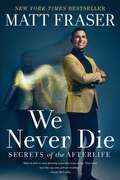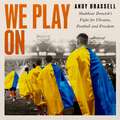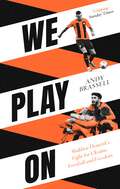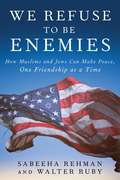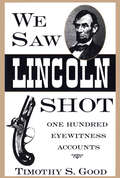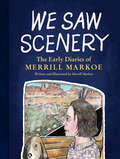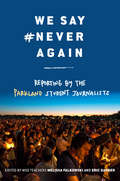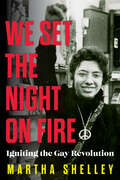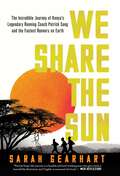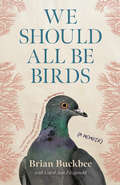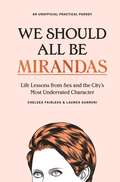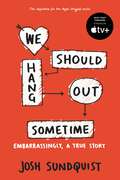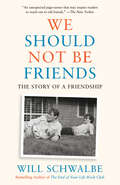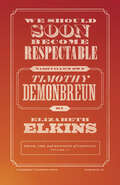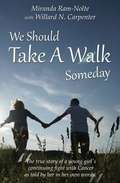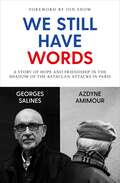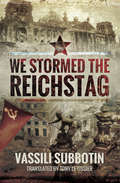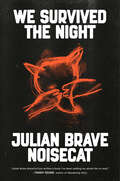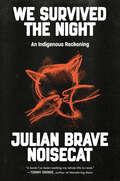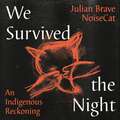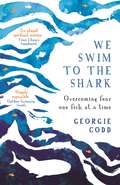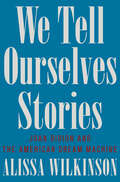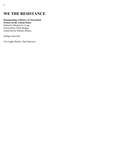- Table View
- List View
We Never Die: Secrets of the Afterlife
by Matt FraserFrom America&’s top psychic medium and the author of When Heaven Calls comes a new book that unveils the secrets of the afterlife, the truth about heaven, and inspires &“us with his comforting certainty that we never die&” (Gloria Estefan).Psychic medium Matt Fraser, author of When Heaven Calls, is back to unpack the number one question folks ask him: &“What happens after death?&” Although we might expect a complicated answer, it&’s actually pretty simple: We never die! Drawing from thousands of conversations with Spirit, Matt pulls back the curtain on life&’s hidden revelations: -What happens when we cross over -The beautiful realities of heaven and eternal life -The guardian angels who keep us safe on Earth (including our pets who have passed) -The role of dreams and how souls appear to the living -Love, romance, and soul mates beyond life -Ghosts, hauntings, negative souls, energy vampires, and psychic protection -Destiny, free will, and second chances -Regrets, amends, and forgiveness from heaven -Figuring out your gifts and purpose -Karma, kindness, and living in the divine flow -How to recognize the signs and messages our loved ones send us from heaven As Matt explains, &“We all have our own &‘phone line&’ to communicate with heaven. All we have to do is figure out how to use it.&” Revealed through never-before-told stories, the wisdom in We Never Die &“is healing the world by making sure we have a strong emotional and spiritual connection, which is the foundation for a healthy life&” (Karamo Brown, star of Queer Eye and author and author of Karamo).
We Play On: Shakhtar Donetsk’s Fight for Ukraine, Football and Freedom
by Andy Brassell'We want to show to the world that we are alive. That we are strong. Not just us - the whole of Ukraine. We are continuing to play. We are continuing to win.' Darijo SrnaShakhtar Donetsk have not played in their home stadium since 2014. Their matchdays now typically have no crowds, air raid sirens interrupt games and thoughts of and fears for family, friends and hometowns frontline troops loom large in the players' minds ahead of every game. These are extraordinary times - but Shakhtar is an extraordinary club.Displaced when fighting first began in the Donbas region, and then again when Russia mounted a full-scale invasion of Ukraine in February 2022, this book honours a club - players, coaching staff, management - who choose to play on. In a time of chaos and conflict, they have become emblems of hope and unity. They are winning on the pitch, and winning hearts and minds across the world.Following the club's meteoric rise from domestic team to domineering European contenders, Andy Brassell expertly weaves a story of Shakhtar through the ages - their origin story after Ukrainian independence, their evolution and their reinvention. The war forced an exodus of star players and staff and the club has had to find itself once again. With direct testimony and exclusive interviews from those at Shakhtar, this book delivers unparalleled insight to the club's journey - one that is all too often hidden from view. The result is an ode to Shakhtar Donetsk, shining a light on the beauty and force of their football and their fight to play on.
We Play On: Shakhtar Donetsk’s Fight for Ukraine, Football and Freedom
by Andy Brassell'We want to show to the world that we are alive. That we are strong. Not just us - the whole of Ukraine. We are continuing to play. We are continuing to win.' Darijo SrnaShakhtar Donetsk have not played in their home stadium since 2014. Their matchdays now typically have no crowds, air raid sirens interrupt games and thoughts of and fears for family, friends and hometowns frontline troops loom large in the players' minds ahead of every game. These are extraordinary times - but Shakhtar is an extraordinary club.Displaced when fighting first began in the Donbas region, and then again when Russia mounted a full-scale invasion of Ukraine in February 2022, this book honours a club - players, coaching staff, management - who choose to play on. In a time of chaos and conflict, they have become emblems of hope and unity. They are winning on the pitch, and winning hearts and minds across the world.Following the club's meteoric rise from domestic team to domineering European contenders, Andy Brassell expertly weaves a story of Shakhtar through the ages - their origin story after Ukrainian independence, their evolution and their reinvention. The war forced an exodus of star players and staff and the club has had to find itself once again. With direct testimony and exclusive interviews from those at Shakhtar, this book delivers unparalleled insight to the club's journey - one that is all too often hidden from view. The result is an ode to Shakhtar Donetsk, shining a light on the beauty and force of their football and their fight to play on.
We Play On: Shakhtar Donetsk’s Fight for Ukraine, Football and Freedom
by Andy Brassell'We want to show to the world that we are alive. That we are strong. Not just us - the whole of Ukraine. We are continuing to play. We are continuing to win.' Darijo SrnaShakhtar Donetsk have not played in their home stadium since 2014. Their matchdays now typically have no crowds, air raid sirens interrupt games and thoughts of and fears for family, friends and hometowns frontline troops loom large in the players' minds ahead of every game. These are extraordinary times - but Shakhtar is an extraordinary club.Displaced when fighting first began in the Donbas region, and then again when Russia mounted a full-scale invasion of Ukraine in February 2022, this book honours a club - players, coaching staff, management - who choose to play on. In a time of chaos and conflict, they have become emblems of hope and unity. They are winning on the pitch, and winning hearts and minds across the world.Following the club's meteoric rise from domestic team to domineering European contenders, Andy Brassell expertly weaves a story of Shakhtar through the ages - their origin story after Ukrainian independence, their evolution and their reinvention. The war forced an exodus of star players and staff and the club has had to find itself once again. With direct testimony and exclusive interviews from those at Shakhtar, this book delivers unparalleled insight to the club's journey - one that is all too often hidden from view. The result is an ode to Shakhtar Donetsk, shining a light on the beauty and force of their football and their fight to play on.
We Refuse to Be Enemies: How Muslims and Jews Can Make Peace, One Friendship at a Time
by Sabeeha Rehman Walter RubyFor readers of The Faith Club, Sons of Abraham, and The Anatomy of Peace, a call for mutual understanding and lessons for getting thereWe Refuse to Be Enemies is a manifesto by two American citizens, a Muslim woman and Jewish man, concerned with the rise of intolerance and bigotry in our country along with resurgent white nationalism. Neither author is an imam, rabbi, scholar, or community leader, but together they have spent decades doing interfaith work and nurturing cooperation among communities. They have learned that, through face-to-face encounters, people of all backgrounds can come to know the Other as a fellow human being and turn her or him into a trusted friend. In this book, they share their experience and guidance. Growing up in Pakistan before she immigrated to the United States, Sabeeha never met a Jew, and her view was colored by the Israeli-Palestinian conflict. In his youth, Walter never met a Muslim, and his opinion was shaped by Leon Uris's Exodus. Yet together they have formed a friendship and collaboration. Tapping their own life stories and entering into dialogue within the book, they explain how they have found commonalities between their respective faiths and discuss shared principles and lessons, how their perceptions of the Other have evolved, and the pushback they faced. They wrestle with the two elephants in the room: the Israeli-Palestinian conflict and polarizing material in their holy texts and history. And they share their vision for reconciliation, offering concrete principles for building an alliance in support of religious freedom and human rights. "As members of the two largest minority faith communities in America, we must stand together at a portentous moment in American history. Neither of our communities will be able to prosper in an America characterized by xenophobia and bigotry.&”—Sabeeha Rehman and Walter Ruby
We Saw Lincoln Shot: One Hundred Eyewitness Accounts
by Timothy S. GoodOn the evening of April 14,1865, when President Abraham Lincoln was assassinated in Ford's Theatre, an entire audience was witness to the tragedy. From diaries, letters, depositions, affidavits, and periodicals, here is a collection of accounts from a variety of theatergoers—who by chance saw one of the truly pivotal events in US history. Providing minute firsthand details recorded over a span of ninety years, We Saw Lincoln Shot explores a subject that will forever be debated. With a sharp focus upon the circumstances reported by one hundred actual witnesses, We Saw Lincoln Shot provides vivid documentation of a momentous evening and exposes errors that have been perpetuated as the assassination has been rendered into written histories.
We Saw Scenery: The Early Diaries of Merrill Markoe
by Merrill Markoe&“Merrill Markoe got all the talent. In addition to being an Emmy-award winning comedy writer, she's also a top-notch artist. We Saw Scenery is revealing, sad, funny, and, above all, relatable. Merrill captures the experience of a young woman finding—and holding onto—her own voice. And we&’re all lucky she did.&” —Nell Scovell, author of Just the Funny Parts In her first-ever graphic memoir, four-time Emmy-winning comedy writer Merrill Markoe unearths her treasured diaries, long kept under lock and key, to illustrate the hilarious story of her preteen and teen years and how she came to realize that her secret power was her humor. Wielding her layered and comically absurd style, Markoe takes readers back through her time as a Girl Scout, where she learned that &“scouting&” was really more about learning housewifery skills, to her earliest crushes on uniquely awful boys and her growing obsession with television. Much has changed in our world since Markoe wrote in her diaries, or has it? Climate change wasn&’t yet a rallying call, but the growing hole in the ozone preoccupied Markoe&’s young mind. No one was flocking to the desert for Burning Man, but Markoe readily partook in the Ken Kesey Acid Test. As she charts the divide between her adolescence and adulthood, Markoe questions and berates her younger self, revealing how much is opaque to us in those young years. Perfect for fans of Roz Chast, Allie Brosh, and Lynda Barry, We Saw Scenery is a laugh-out-loud story of a girl growing up, told from the perspective of the woman she became, and it will speak to all who wanted to understand themselves in the midst of their own maturing.
We Say #NeverAgain: Reporting by the Parkland Student Journalists
by Melissa Falkowski Eric GarnerA journalistic look at the shooting at Marjory Stoneman Douglas High School in Parkland and the fight for gun control--as told by the student reporters for the school's newspaper and TV station.This timely and media-driven approach to the Parkland shooting, as reported by teens in the journalism and broadcasting programs and in the Marjory Stoneman Douglas newspaper, is an inside look at that tragic day and the events that followed that only they could tell.It showcases how the teens have become media savvy and the skills they have learned and honed--harnessing social media, speaking to the press, and writing effective op-eds. Students will also share specific insight into what it has been like being approached by the press and how that has informed the way they interview their own subjects.
We Set the Night on Fire: Igniting the Gay Revolution
by Martha ShelleyMartha Shelley didn't start out in life wanting to become a gay activist, or an activist of any kind. The daughter of Jewish refugees and undocumented immigrants in New York City, she grew up during the Red Scare of the late 1940s and 1950s, was inspired by the civil rights and anti–Vietnam War movements that followed, and struggled with coming out as a lesbian at a time when being gay made her a criminal. Shelley rose to become a public speaker for the New York chapter of the lesbian rights group the Daughters of Bilitis, organized the first gay march in response to the Stonewall Riots of 1969, and then cofounded the Gay Liberation Front. She coproduced the newspaper Come Out!, worked on the women's takeover of the RAT Subterranean News, and took a central role in the Lavender Menace action to confront homophobia in the women's movement.Martha Shelley's story is a feminist and lesbian document that gives context and adds necessary humanity to the historical record.
We Share the Sun: The Incredible Journey of Kenya's Legendary Running Coach Patrick Sang and the Fastest Runners on Earth
by Sarah GearhartAn enlightening biography and gripping sports narrative that takes us behind the scenes into the lives of some of the world&’s most elite runners in Kenya and their coach, Patrick Sang. At a secluded training camp in Kaptagat, Kenya, a small town nearly 8,000 feet above sea level in the Great Rift Valley, three-dozen world-class runners, including Olympic champions, world record holders and the fastest marathoner of all-time, share simple dormitory-style rooms and endure grueling workouts six days a week. These determined, devoted, and selfless runners are who they are because of a man named Patrick Sang. One of the greatest—and least-heralded coaches in the sport—Sang is described by his athletes as a &“life coach.&” In We Share the Sun, Sarah Gearhart takes us inside this high-octane world of elites of which few are even aware of and even fewer have ever seen. We are immersed in Sang&’s remarkable story, from his college days in the U.S. to winning an Olympic medal in the steeplechase, and his journey to become a man who redefines what coaching means. There is no singular secret to athletic success, but, as readers will learn, Sang&’s holistic philosophy is like no other approach in the world. It is rooted in developing athletes who can navigate the pressures of elite competition—and life itself. In these pages, we explore Sang&’s influence on his athletes — including his unique and longstanding relationship with marathon world record holder Eliud Kipchoge — as they prepare for the delayed Tokyo Olympics and other competitions. We witness the remarkable recovery of two-time New York City Marathon champion Geoffrey Kamworor after a freak accident as he strives to earn his first Olympic medal. And we follow one of the world&’s most dominant mid-distance runners, Faith Kipyegon, as she attempts a historic repeat title in the 1,500 meters three years after the birth of her first child. We Share the Sun brings forth the remarkable lives and stories of East African runners, whose stories are seldom shared. Through Gearhart's vivid prose, we experience the richness that exists in Kenya as we come as close as we possibly can to running alongside the new generation of elites—and the man who molds them into champions.
We Should All Be Birds: A Memoir
by Brian Buckbee Carol Ann FitzgeraldA charming and moving debut memoir about how a man with a mystery illness saves a pigeon, and how the pigeon saves the man. "I loved every page of this book: funny, sad, romantic, and full of pigeons."—Sy Montgomery On a spring evening in Montana, Brian Buckbee encounters an injured baby pigeon. Heartbroken after the loss of the love of his life and increasingly isolated by a mysterious illness that overtook him while trekking through Asia, Brian is unaware that this bird—who he names Two-Step—will change his life. Brian takes in Two-Step, and more injured birds, eventually transforming his home into a madcap bird rehabilitation and rescue center. As Brian and Two-Step grow closer, an unexpected kinship forms. But their paths won’t converge forever: as Two-Step heals and finds love, Brian’s condition worsens, and with his friend’s release back into the world looming closer, Brian must decide where this story leaves him. We Should All Be Birds follows Brian, unable to read or write due to a never-ending headache, as he dictates the end of his old life—as an adventurer, an iconoclastic university instructor, and endurance athlete—through his relationship with a pigeon that comes to define his present. Limited to dictation, Brian teams up with Carol Ann Fitzgerald, an editor who channels the details of his personal history to the pages. Raw and perceptive, delirious and devastating, We Should All Be Birds is an unflinching exploration of chronic illness, grief, connection, and the spectacular beauty of the natural world—and the humble pigeon. The surprising, heartwarming relationship between man and bird provides insight into what it means to love, to suffer, and to "never forget, even for a second, how big it all is."
We Should All Be Mirandas: Life Lessons from Sex and the City's Most Underrated Character
by Chelsea Fairless Lauren GarroniWhen Sex and the City premiered, many were hesitant to identify as the Miranda of their social circle - after all, sarcasm, workaholism, and dubious fashion choices are rarely considered aspirational. However, in the two-plus decades since her television debut, our culture has finally caught up with this forward-thinking icon and all she represents. The truth is, Miranda Hobbes is the feminist hero that we deserve - we were all just too busy obsessing over Carrie's corset tops to notice it at first.WE SHOULD ALL BE MIRANDAS is a celebration of a certain redheaded lawyer and the legions of fans who relate to her pragmatic, no-bullshit approach to work, love, and sex. Written by two self-proclaimed Mirandas, this humorous manifesto distils Ms. Hobbes' core principles into a strategic guide for navigating life's inevitable ups and downs. In it, you'll learn to:Overcome your internalised MirandaphobiaCope with humiliating sexual encountersMake Google Docs your bitchDump that Skipper that you've been datingEmbrace your bad hair days ...and so much more!With sharp, sardonic humor and nods to the series' most iconic moments, We Should All Be Mirandas is the perfect gift for fashionistas, pop culture mavens, and every woman who has dared to eat cake out of the garbage.
We Should Hang Out Sometime: Embarrassingly, a true story
by Josh Sundquist<P>When I was twenty-five years old, it came to my attention that I had never had a girlfriend. At the time, I was actually under the impression that I was in a relationship, so this bit of news came as something of a shock.Why was Josh still single? To find out, he tracked down each of the girls he had tried to date since middle school and asked them straight up: What went wrong? <P>The results of Josh's semiscientific investigation are in your hands. From a disastrous Putt-Putt date involving a backward prosthetic foot, to his introduction to CFD (Close Fast Dancing), and a misguided "grand gesture" at a Miss America pageant, this story is about looking for love-or at least a girlfriend-in all the wrong places.Poignant, relatable, and totally hilarious, this memoir is for anyone who has ever wondered, "Is there something wrong with me?" <P>(Spoiler Alert: the answer is no.)
We Should Not Be Friends: The Story of a Friendship
by Will SchwalbeA NEW YORKER BEST BOOK OF THE YEAR • A warm, funny, irresistible memoir that follows an improbable and life-changing college friendship over the course of forty years—from the best-selling author of The End of Your Life Book Club • &“A rare view of male friendship.&”—NPR&“Moving…salted with Schwalbe&’s well-established literary intelligence and a palpable empathy.&” —The New York Times Book ReviewBy the time Will Schwalbe was a junior at college, he had already met everyone he cared to know: the theater people, writers, visual artists and comp lit majors, and various other quirky characters including the handful of students who shared his own major, Latin and Greek. He also knew exactly who he wanted to avoid: the jocks. The jocks wore baseball caps and moved in packs, filling boisterous tables in the dining hall, and on the whole seemed to be another species entirely, one Will might encounter only at his own peril. All this changed dramatically when Will collided with Chris Maxey, known to just about everyone as Maxey. Maxey was physically imposing, loud, and a star wrestler who was determined to become a Navy SEAL (where he would later serve for six years). Thanks to the strangely liberating circumstances of a little-known secret society at Yale, the two forged a bond that would become a mainstay of each other&’s lives as they repeatedly lost and found each other and themselves in the years after graduation. From New Haven to New York City, from Hong Kong and Panama to a remarkable school on an island in the Bahamas—through marriages and a divorce, triumphs and devastating losses—We Should Not Be Friends tracks an extraordinary friendship over decades of challenge and change. Schwalbe&’s marvelous new work is, at its heart, a joyful testament to the miracle of human connection—and how if we can just get past our preconceptions, we may find some of our greatest friends.
We Should Soon Become Respectable: Nashville's Own Timothy Demonbreun (Truths, Lies, and Histories of Nashville)
by Elizabeth ElkinsJacques-Timothe Boucher Sieur de Montbrun (anglicized to Demonbreun), born 1747 in Quebec, set the bar for country music's stories of cheating, gambling, drinking, and being the boss more than two centuries before anybody thought of supporting the storyline with a 1-4-5-4 chord progression and a fiddle. Lightly called a "fur trader," he came to the city to make his fortune and fame, much like songwriters today. Looking back, it would be easy to call Demonbreun, the son of French Canadian near-royalty and brother to two nuns, a spoiled child who did what he wanted, a classic-case misogynist and polygamist, a conceited adventurer. He was a man who conned the Spanish governor out of a war, carried on graceful correspondence with Thomas Jefferson and Alexander Hamilton, owned several slaves, may have served as a spy, and was a decorated veteran. He fought in the Revolutionary War, extraordinarily so it seems, given the number of land grants he received across Kentucky and Tennessee. He's also known around Nashville as the guy who lived in a cave. Author Elizabeth Elkins sorts through the legends and nails down the facts in order to present the true story of "Nashville's First Citizen."
We Should Take A Walk Someday: Short Story With Personal Journal Space. The True Story Of What Was A Young Girl's Continuing Fight With Cancer As Told By Her In Her Own Words
by Miranda Ram-Nolte Willard CarpenterHow far would you go to keep your sanity? At what point is death a solution? As a carefree child, I never would have entertained these ideas. They were foreign to me, as I was, and generally still am, a very happy person. But there was a time when I wasn't so happy. There was a time when I felt trapped within my own thoughts and eaten alive by my own fears. I've avoided this topic for four years now, and even in the midst of the happening I still avoided the reality. So reader, how far would you go to keep your sanity? Because I'm about to tell you just how far I went and just how insane it made me become. We Should Take A Walk Someday is the true story of a young girls fight with Cancer and her faith which sustained her until she succumbed to her illness. Last 100+ pages is effectively blank journal pages except last page is rear cover material.
We Still Have Words
by Georges Salines Azdyne AmimourGeorges Salines lost his daughter Lola in the attack on the Bataclan Theatre in Paris on 13th November 2015. Azdyne Amimour lost his son. Both were aged 28. Lola was one of the 90 victims, Amimour's son one of the attackers. From his meeting with Azdyne Amimour, an unprecedented dialogue emerged. Georges Salines carries the memory of his daughter and many other victims, while Azdyne Amimour seeks to understand how his son was able to commit acts which he condemns without appeal. Driven by mutual curiosity, the two tell their stories and unfold the story of 'their' 13th November. In the course of this conversation, a deep respect was born between these two fathers whom everything should nevertheless have opposed. Their testimony feeds a peaceful reflection on radicalization, education and mourning. Because if there are words left, there is also hope.
We Stormed the Reichstag
by Tony Le TissierIn 1941 when Germany invaded the Soviet Union Vassili Subbotin was caught up as an ordinary soldier in the Red Armys great retreat. In 1945, during the final days of the war, as a war correspondent, he went into Berlin with the troops who fought the ferocious final battles in the streets and sealed Germanys defeat. Later he recorded in vivid impressionistic detail the climax of the last act of the campaign and of the entire war in the east the storming of the Reichstag which came to symbolize of the Soviet victory over the Nazis. His firsthand experience of that final operation and his insight into the small band of ordinary soldiers who played a part in it is graphically conveyed in this memoir. In his description of the confusion and violence of the street fighting around the Reichstag and the vicious hand-to-hand floor-by-floor struggle to capture the huge shattered building, the personalities of the soldiers are revealed, as are their fears and determination. Vassili Subbotin served as a conscript in the Red Army during the Second World War, first as an infantryman during the Soviet retreat after the German invasion in 1941, then as a divisional war correspondent during the Red Armys long advance towards Germany. He was present throughout the final battle for Berlin and observed the capture of the Reichstag at first hand. After the war he wrote this evocative memoir recording his experiences and those of the soldiers who took part, and in later life he was reunited with those who survived the fighting.
We Survived the Night
by Julian Brave NoiseCatA stunning narrative from one of the most powerful young writers at work today, and the director of the Oscar®-nominated documentary, Sugarcane, We Survived the Night interweaves oral history with hard-hitting journalism and a deeply personal father-son journey into a searing portrait of Indigenous survival, love, and resurgence.&“Julian Brave NoiseCat seamlessly connects true tales of identity and betrayal, love and abandonment, clarity and confusion. We Survived the Night is a whirling, radiant gift to the reader.&” —Louise Erdrich, author of The Night WatchmanJulian Brave NoiseCat&’s childhood was rich with culture and contradictions. When his Secwépemc and St&’at&’imc father, an artist haunted by a turbulent past, abandoned the family, NoiseCat and his non-Native mother were embraced by the urban Native community in Oakland, California, as well as by family on the Canim Lake Indian Reserve in British Columbia. In his father&’s absence, NoiseCat immersed himself in Native history and culture to understand the man he seldom saw—his past, his story, where he came from—and, by extension, himself.Years later, NoiseCat sets out across the continent to correct the erasure, invisibility, and misconceptions surrounding the First Peoples of this land as he develops his voice as a storyteller and artist. Told in the style of a "Coyote Story," a legend about the trickster forefather of NoiseCat&’s people who was revered for his wit and mocked for his tendency to self-destruct, We Survived the Night brings a traditional art form nearly annihilated by colonization back to life on the page. Through a dazzling blend of history and mythology, memoir and reportage, NoiseCat unravels old stories and braids together new ones. He grapples with the erasure of North America's First Peoples and the trauma that cascades across generations, while illuminating the vital Indigenous cultural, environmental, and political movements reshaping the future. He chronicles the historic ascent of the first Native American cabinet secretary in the United States and the first Indigenous sovereign of Canada; probes the colonial origins and limits of racial ideology and Indian identity through the story of the Lumbee Tribe of North Carolina; and hauls the golden eggs of an imperiled fish out of the sea alongside the Tlingit of Sitka, Alaska. This is a rewriting and a restoration—of Native history and, more intimately, of family and self, as NoiseCat seeks to reclaim a culture effaced by colonization and reconcile with a father who left. Virtuosic, compelling, and deeply moving, this is at once an intensely personal journey and a searing portrait of Indigenous survival, love, and resurgence.Drawing from five years of on-the-ground reporting, We Survived the Night paints a profound and unforgettable portrait of contemporary Indigenous life, alongside an intimate and deeply powerful reckoning between a father and a son. A soulful, formally daring, and indelible work from an important new voice.
We Survived the Night: An Indigenous Reckoning
by Julian Brave NoiseCatA stunning narrative from one of the most powerful young writers at work today, and the director of the Oscar®-nominated documentary, Sugarcane, We Survived the Night interweaves oral history with hard-hitting journalism and a deeply personal father-son journey into a searing portrait of Indigenous survival, love, and resurgence.&“Julian Brave NoiseCat seamlessly connects true tales of identity and betrayal, love and abandonment, clarity and confusion. We Survived the Night is a whirling, radiant gift to the reader.&” —Louise Erdrich, author of The Night WatchmanJulian Brave NoiseCat&’s childhood was rich with culture and contradictions. When his Secwépemc and St&’at&’imc father, an artist haunted by a turbulent past, abandoned the family, NoiseCat and his non-Native mother were embraced by the urban Native community in Oakland, California, as well as by family on the Canim Lake Indian Reserve in British Columbia. In his father&’s absence, NoiseCat immersed himself in Native history and culture to understand the man he seldom saw—his past, his story, where he came from—and, by extension, himself.Years later, NoiseCat sets out across the continent to correct the erasure, invisibility, and misconceptions surrounding the First Peoples of this land as he develops his voice as a storyteller and artist. Told in the style of a "Coyote Story," a legend about the trickster forefather of NoiseCat&’s people who was revered for his wit and mocked for his tendency to self-destruct, We Survived the Night brings a traditional art form nearly annihilated by colonization back to life on the page. Through a dazzling blend of history and mythology, memoir and reportage, NoiseCat unravels old stories and braids together new ones. He grapples with the erasure of North America's First Peoples and the trauma that cascades across generations, while illuminating the vital Indigenous cultural, environmental, and political movements reshaping the future. He chronicles the historic ascent of the first Native American cabinet secretary in the United States and the first Indigenous sovereign of Canada; probes the colonial origins and limits of racial ideology and Indian identity through the story of the Lumbee Tribe of North Carolina; and hauls the golden eggs of an imperiled fish out of the sea alongside the Tlingit of Sitka, Alaska. This is a rewriting and a restoration—of Native history and, more intimately, of family and self, as NoiseCat seeks to reclaim a culture effaced by colonization and reconcile with a father who left. Virtuosic, compelling, and deeply moving, this is at once an intensely personal journey and a searing portrait of Indigenous survival, love, and resurgence.Drawing from five years of on-the-ground reporting, We Survived the Night paints a profound and unforgettable portrait of contemporary Indigenous life, alongside an intimate and deeply powerful reckoning between a father and a son. A soulful, formally daring, and indelible work from an important new voice.
We Survived the Night: An Indigenous Reckoning
by Julian Brave NoiseCatREAD BY THE AUTHOR. - 'A powerful, beautiful, wrenching masterpiece ... both a memoir and something that reaches far beyond the personal'' REBECCA SOLNIT, author of HOPE IN THE DARK 'The book I've been waiting my whole life to read' TOMMY ORANGE, author of the Booker longlisted WANDERING STARS 'A story that must be told' KATHLEEN DUVAL, Pulitzer Prize-winning author of NATIVE NATIONS - "In my people's language, we greet each other each morning by saying "Tsecwínucw-k: 'You survived the night"' One dark night, a new-born is discovered dumped inside a waste incinerator. The boy, rescued from death, grows into a man who will in turn abandon his own children, including his first-born son Julian Brave NoiseCat. Behind this father-son story lies an even darker history of abuse, colonialism and vicious attempts to erase North America's First Peoples from their land. Told in the style of a 'Coyote Story', a legend of the trickster forefather of NoiseCat's people, We Survived the Night brings a vanishing artform back to life in this dazzling account of contemporary Indigenous North America. Braiding on-the-ground reportage together with intimate experience, history with mythology, NoiseCat grapples with trauma that cascades across generations to uncover truths about himself, his family and his people - how they survived and how, through vital political, environmental and cultural movements, they are coming back. An inventive, illuminating and moving narrative from one of the most compelling artists at work today, We Survived the Night is both reconciliation and celebration of Indigenous pain, hope and resurgence - and their power to shape a collective future. Here is an unforgettable journey of restoration through father-son ties and historic reckoning of Indigenous people, announcing a major new literary talent. *Includes a downloadable PDF with a partial family tree, a map, a selected bibliography, and the glossary from the print edition of the book*
We Swim to the Shark: Overcoming fear one fish at a time
by Georgie CoddGeorgie Codd is scared of fish. Really, really scared.Loving the sea and resenting her phobia, she plots to cross continents, learn to dive and swim with the world's biggest fish: the mighty whale shark.Georgie soon plunges into a realm of strange creatures and intrepid diving adventurers. But as her quest to fight fear expands over oceans, the shark remains elusive, and everything else starts to fall apart around her.'We Swim to the Shark is a lesson in not giving up . . . as with all good adventure stories, the real benefit is in the searching' THE I'An almost spiritual mission' TIMES LITERARY SUPPLEMENT 'A terrific read' BBC RADIO NORFOLK 'An enthralling ride' ABC MELBOURNE
We Swim to the Shark: Overcoming fear one fish at a time
by Georgie CoddGeorgie Codd is scared of fish. Really, really scared.Loving the sea and resenting her phobia, she plots to cross continents, learn to dive and swim with the world's biggest fish: the mighty whale shark.Georgie soon plunges into a realm of strange creatures and intrepid diving adventurers. But as her quest to fight fear expands over oceans, the shark remains elusive, and everything else starts to fall apart around her.'We Swim to the Shark is a lesson in not giving up . . . as with all good adventure stories, the real benefit is in the searching' THE I'An almost spiritual mission' TIMES LITERARY SUPPLEMENT 'A terrific read' BBC RADIO NORFOLK 'An enthralling ride' ABC MELBOURNE
We Tell Ourselves Stories: Joan Didion and the American Dream Machine
by Alissa WilkinsonNamed one of the Most Anticipated Books of 2025 by the Washington Post, Los Angeles Times, W Magazine, and The Millions, and one of the Best Books of Spring 2025 by Oprah Daily and Town & Country Named one of the Most Anticipated Books of the month by the New York Times, Town & Country, and the Los Angeles Times. “Sharp, elegant and eye-opening . . . a crucial toolbox for understanding both Joan Didion and Hollywood.” —Emily Nussbaum Joan Didion opened The White Album (1979) with what would become one of the most iconic lines in American literature: “We tell ourselves stories in order to live.” Today, this phrase is deployed inspirationally, printed on T-shirts and posters, used as a battle cry for artists and writers. In truth, Didion was describing something much less rosy: our human tendency to manufacture delusions that might ward away our anxieties when society seems to spin off its axis. Nowhere was this collective hallucination more effectively crafted than in Hollywood. In this riveting cultural biography, New York Times film critic Alissa Wilkinson examines Joan Didion’s influence through the lens of American mythmaking. As a young girl, Didion was infatuated with John Wayne and his on-screen bravado, and was fascinated by her California pioneer ancestry and the infamous Donner Party. The mythos that preoccupied her early years continued to influence her work as a magazine writer and film critic in New York, offering glimmers of the many stories Didion told herself that would come to unravel over the course of her career. But out west, show business beckoned. We Tell Ourselves Stories eloquently traces Didion’s journey from New York to her arrival in Hollywood as a screenwriter at the twilight of the old studio system. She spent much of her adult life deeply embroiled in the glitz and glamor of the Los Angeles elite, where she acutely observed—and denounced—how the nation’s fears and dreams were sensationalized on screen. Meanwhile, she paid the bills writing movie scripts like A Star Is Born, while her books propelled her to celestial heights of fame. Peering through a scrim of celluloid, Wilkinson incisively dissects the cinematic motifs and machinations that informed Didion’s writing—and how her writing, ultimately, demonstrated Hollywood’s addictive grasp on the American imagination. More than a portrait of a writer, We Tell Ourselves Stories shines a new light on a legacy whose impact will be felt for generations.
We The Resistance: Documenting A History Of Nonviolent Protest In The United States
by Chris Hedges Michael G. Long Dolores Huerta"A highly relevant, inclusive collection of voices from the roots of resistance. . . . Empowering words to challenge, confront, and defy."--Kirkus Reviews "This book fights fascism. This books offers hope. We The Resistance is essential reading for those who wish to understand how popular movements built around nonviolence have changed the world and why they retain the power to do so again."—Jonathan Eig, author of Ali: A Life
